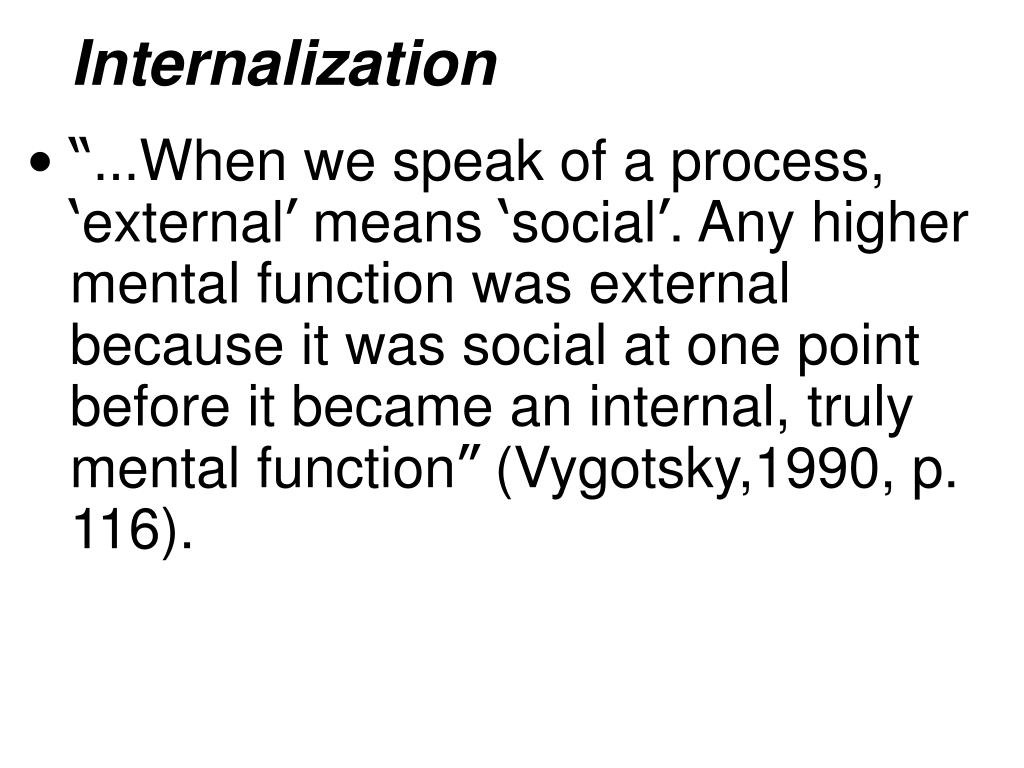Have you ever found yourself automatically complying with social norms, even if you can’t explain exactly why? Do you find yourself instinctively avoiding certain behaviors simply because they seem “wrong”? This, my friend, is the captivating power of internalization. It’s the invisible force that shapes our beliefs, attitudes, and actions, subtly transforming external societal expectations into our own internal compass.

Image: www.abebooks.com
In the realm of sociology, internalization is a critical concept that helps us understand how individuals become integrated into society. It’s not just about blindly following rules; it’s about the complex process of absorbing social norms, values, and beliefs so deeply that they become ingrained in our very being.
The Socialization Machine: How We Learn the Ropes
Internalization is a key part of socialization, the ongoing process of learning and adapting to the social world around us. Think of it like a giant, multi-faceted machine, constantly churning, sifting, and refining our understanding of how to navigate life. From the moment we open our eyes, we’re bombarded with social cues and expectations. We learn to behave, think, and even feel in accordance with these cues, gradually integrating them into our own sense of self.
But how does this happen? Imagine a child learning to say “please” and “thank you.” At first, a parent might offer gentle reminders, prompting the child to use these polite expressions. Over time, as the child internalizes these social norms, using polite language becomes a natural part of their behavior, no longer needing external prompting.
Internalization in Action: Examples from Everyday Life
Internalization is a powerful force, shaping our interactions, beliefs, and even our identities. Here are some examples of how it plays out in our daily lives:
- Gender Roles: We internalize gender roles from a young age. Through toys, clothes, and societal expectations, we learn what behaviors are deemed appropriate for each gender. This can influence career choices, hobbies, and even how we perceive ourselves.
- Language and Communication: The way we speak, our choice of words, even our accents, are often influenced by internalized social norms. We adapt our communication style to fit in with the specific social groups we belong to.
- Moral Values: Our sense of right and wrong is not innate. We internalize moral values from our families, communities, and broader society. This helps us navigate ethical dilemmas and guide our choices.
- Political Beliefs: Our political affiliations are often shaped by internalized ideologies and perspectives from our families, communities, and cultural influences.
Internalization: More Than Just a Passive Process
While internalization often happens subtly and unconsciously, it’s not solely a passive experience. We’re not simply empty vessels receiving social information. We actively interpret and process these norms, shaping them through our own experiences and individual perspectives. This is where internalization becomes a crucial link between the individual and society.

Image: www.slideserve.com
The Upside and the Downside: Navigating the Spectrum of Internalization
Internalization can have both positive and negative consequences. On the positive side, it fosters social cohesion and helps us understand and navigate the complexities of social life. It teaches us how to cooperate, empathize with others, and contribute to a functioning society.
However, internalization can also perpetuate harmful stereotypes and societal inequalities. If we internalize negative messages about certain groups of people, it can lead to prejudice, discrimination, and even violence.
Beyond the Classroom: The Role of Internalization in Identity Formation
Internalization also plays a crucial role in shaping our individual identities. As we interact with the world, we internalize different social categories, such as our race, ethnicity, gender, and social class. These internalized categories become integral parts of who we are, influencing our self-perception and sense of place in the world.
Internalization and the Power of Social Change
The good news is that internalization is not a one-way street. It’s a dynamic and ongoing process that can be influenced and reshaped. By challenging existing norms and working to create a more just and equitable society, we can challenge harmful internalizations and foster positive social change.
Expert Insights: Unlocking the Power of Internalization
Dr. Sarah Jones, a leading sociologist specializing in social psychology, explains that internalization is a powerful tool for social change. “By understanding how internalization works, we can identify and challenge harmful societal messages. We can then work to replace these messages with more positive and empowering narratives,” she says.
Actionable Steps: Making Internalization Work for You
- Become a Conscious Observer: Pay attention to the messages you’re receiving from your environment. Are they perpetuating stereotypes or harmful beliefs?
- Seek Out Diverse Perspectives: Expose yourself to different points of view and challenge your own assumptions. Step outside of your comfort zone and learn from people with diverse backgrounds and experiences.
- Engage in Critical Thinking: Examine your own beliefs and biases. Ask yourself: How did I learn these? Are they based on factual evidence or on stereotypes?
- Speak Up for Justice: Use your voice to challenge harmful social norms and advocate for equality. Be an ally to marginalized groups and work to create a more just and equitable society.
What Is Internalization In Sociology
Conclusion: Embracing the Power of Internalization
Internalization is a complex and multifaceted process that shapes our lives in profound ways. By understanding its role in shaping our beliefs, attitudes, and actions, we can become more conscious citizens, actively working to create a more just and equitable world. So, let’s use our knowledge of internalization to navigate the social landscape with empathy, open-mindedness, and a commitment to positive change.






